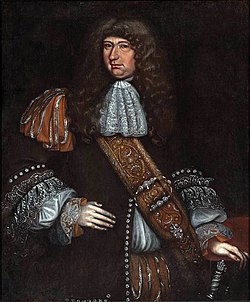Sir George Downing, 1st Baronet
| Sir George Downing, Bt | |
|---|---|

Portrait by Thomas Smith, c. 1675–1690
|
|
| Teller of the Exchequer | |
|
In office 1660–1684 |
|
| Monarch | Charles II |
| Succeeded by | Simon Clifford |
| Member of Parliament for Morpeth | |
|
In office April 1660 – 1684 |
|
| Monarch | Charles II |
| Member of Parliament for Carlisle | |
|
In office 1656–1660 Serving with Thomas Craister |
|
| Member of Parliament for Edinburgh | |
|
In office 1654–1656 Serving with Samuel Desborrow |
|
| Personal details | |
| Born |
c. 1622–24 Dublin, Kingdom of Ireland |
| Died | 22 July 1684 (aged 60-62) |
| Alma mater | Harvard College |
| Military service | |
| Allegiance | Commonwealth of England |
| Commands | Scoutmaster-General of Commonwealth Forces in Scotland |
| Battles/wars | Third English Civil War |
Sir George Downing, 1st Baronet (1623 – 22 July 1684) was an Anglo-Irish preacher, soldier, statesman, diplomat, turncoat and spy, after whom Downing Street in London is named. As Treasury Secretary he is credited with instituting major reforms in public finance. His influence was substantial on the passage and substance of the mercantilist Navigation Acts. The Acts strengthened English commercial and Naval power, contributing to the security of the English state and its ability to project its power abroad. More than any other man he was responsible for arranging the acquisition of New York from the Dutch, and is remembered there in the name of Downing Street, in Manhattan and Brooklyn, New York.
He was the son of Emmanuel Downing, barrister, and of Lucy Winthrop, sister of Massachusetts Bay Governor John Winthrop. He was born in Dublin, Ireland. While Downing Street, London, is named after him, Downing College, Cambridge derives its name from his grandson, Sir George Downing, 3rd Baronet. The title became extinct when the 3rd Baronet's cousin, Sir Jacob Downing, 4th Baronet, died in 1764.
His family joined Winthrop in America in 1638, settling in Salem, Massachusetts. Downing attended Harvard College and was one of nine students in the first graduating class of 1642. He was hired by Harvard as the college's first tutor. In 1645 he sailed for the West Indies with slaves in tow, as a preacher and instructor of the seamen, and arrived in England some time afterwards, becoming chaplain to Colonel John Okey's regiment (who had originally sponsored Downing's education in America).
Subsequently he seems to have abandoned preaching for a military career, and in 1650 he was scoutmaster-general of Cromwell's forces in Scotland, and as such received in 1657 a salary of £365 and £500 as a Teller of the Exchequer.
...
Wikipedia
